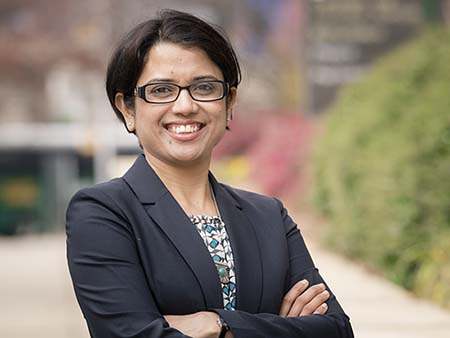 The novel coronavirus has impacted the nation in significant ways.
The novel coronavirus has impacted the nation in significant ways.
People everywhere are trying to find different avenues to better share information on the severity of the virus and the pandemic as a whole.
Non-major biology students at the University of Alabama at Birmingham are also helping to make a difference.
Samiksha Raut, Ph.D., associate professor in the College of Arts and Sciences’ Department of Biology, led her Biology 101 students to work hands-on as a team. Their mission is to provide the community with important information needed for their overall health and safety related to the COVID-19 pandemic.
“Misinformation among the general public is rising as fast as the COVID-19 cases, and therefore, science communication plays a critical role in helping to bring evidence-based facts to light,” Raut said. She modified the last quarter of her semester syllabus into a second service-learning project “COVID-19 Awareness” module.
Raut justifies that introducing this project felt like the need of the hour; with campus closure, the students were able to smoothly transition to an online platform.
Raut has been teaching non-majors the last three years. She has extensively modified the course from a textbook style, topic-based mode of instruction to an active, theme-based approach to present science as it relates to day-to-day life. She introduces the students to basic concepts in biology by discussing cutting-edge topics like climate change, plastic pollution, vaccination, evolution, cancer and, very recently, opioid addiction. This course is the first STEM course on the UAB campus with an embedded service-learning module for more than 100 students.
“Ideally, non-major students rely on taking one or two science classes,” Raut said. “It is therefore imperative to boost their confidence in the understanding of science, to give rise to an informed science citizenry constituting tomorrow’s voters, workers, consumers and policymakers.”
Halfway through this semester, after gaining better insights on biology basics, the class began to receive lectures related to the first service-learning module, “Opioid Awareness.” This included testimonials from individuals who had experiences with opioids, such as rehabilitated addicts and medical professionals on the front lines of the opioid crisis in Alabama. A similar strategy was quickly adapted for the second service-learning module on COVID-19 awareness.
Students were introduced to different aspects of COVID-19, including its virology, epidemiological principles involved in its transmission, prevention and a special focus on health disparities. Drs. Sumit Singh, Bertha Hidalgo and Ana Lucia Oliveira assisted Raut in the execution of this module. Students were required to take note of the information to help educate the community via service-learning projects by creating infographics and tabling events throughout campus.
| “Misinformation among the general public is rising as fast as the COVID-19 cases, and therefore, science communication plays a critical role in helping to bring evidence-based facts to light.” – Associate professor of biology Samiksha Raut |
Elizabeth Stephens, a freshman from Birmingham, says she and her classmates were passionate about the project.
“After discussing how we would approach our topic, we realized that we would fall short of our responsibility to the community if we let the project end there,” Stephens said. “So we decided to make an Instagram account, @uab.awareness, to educate others outside of our community. At the end of the semester, we passed the project off to next semester’s class so they could continue to educate our following on other pressing topics in future courses.”
Unfortunately, in light of COVID-19, the class moved to an online platform; Raut immediately decided that her students could not stop educating others and would move their projects online as well as post them to their social media. But she did not stop there.
“Dr. Raut said we needed to also inform others on COVID-19,” Stephens said. “So, my teammates and I, already prepared, listened to lectures that she brought in for us, did our own research and posted this information onto our Instagram account as infographics.”
Eshaan Sethi, a junior from New Delhi, India, says Raut’s storytelling teaching approach helped the class to work efficiently and in a more creative way.
“Dr. Raut wanted us to form a social understanding of science so people could understand it in the best way possible,” Sethi said. “The project we did on COVID-19 gave me more knowledge based on the research we found. We updated people on how to maintain their hygiene, keep high immunity levels and practice social distancing at its best.”
 Samiksha Raut, Ph.D., associate professor in the College of Arts and Sciences’ Department of BiologyAnn Marie Stephens, a freshman from Hoover, Alabama, says the class helped her realize she could make a difference in the world during the pandemic.
Samiksha Raut, Ph.D., associate professor in the College of Arts and Sciences’ Department of BiologyAnn Marie Stephens, a freshman from Hoover, Alabama, says the class helped her realize she could make a difference in the world during the pandemic.
“I didn’t know how I could help at first; but after this project, I realized that spreading awareness and knowledge was something that I could do, and it made a difference,” Stephens said.
Becca Hasenbein, a freshman from Trussville, Alabama, says she learned a lot about the severity of the coronavirus, and she now feels more informed and aware of what she can do to play her part.
“I think this project can bring awareness to not only the students involved, but also to the surrounding community, allowing us to come together as a more knowledgeable and united society.”